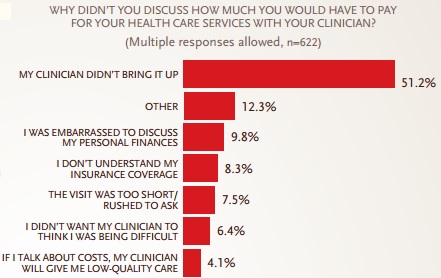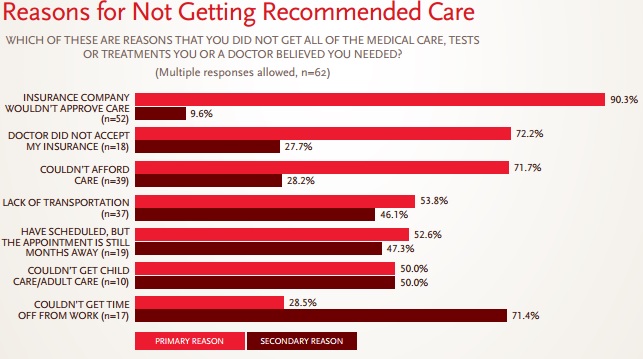Providers Skip Healthcare Costs Talk with 68% of Cancer Patients
While out-of-pocket spending was greater than expected for 43 percent of cancer patients, only 22 percent discussed healthcare costs with providers, found a new study.

- As providers face increased patient financial responsibility, healthcare costs discussions with patients are becoming more important for obtaining full payment. But a new study from the Cancer Support Community showed that many providers are skipping these talks with cancer patients.

Approximately 68 percent of individuals who underwent cancer treatments reported not having a healthcare costs discussion with their providers and ten percent could not recall if the discussion was had before receiving treatment.
Only 22 percent of cancer patients reported talking about healthcare costs with their providers prior to treatment.
“The increasing cost of cancer care in the US, coupled with added financial responsibility shifting to patients, demands patients and providers consider cost as a part of the treatment discussion,” stated the study.
The cost associated with cancer care was $157 billion in 2010, but the National Cancer Institute projected in 2011 that cancer care costs would increase to $174 billion by 2020.
As cancer care spending increased, the study found that patients took on more of the financial responsibility for treatment. Almost 43 percent of the 1,218 cancer patients surveyed reported that their out-of-pocket expenses were larger than expected in the last year.
Individuals who were covered by employer-sponsored plans were more likely to face greater out-of-pocket costs with roughly 50 percent of participants, reported researchers.
Medicare-covered individuals were the least likely to report larger out-of-pocket costs (32.5 percent) and were most likely to experience out-of-pocket expenses that were about what they expected (43.9 percent).
Despite growing out-of-pocket expenses in the last year, the study indicated that providers still were not discussing healthcare costs with patients prior to treatment. The primary reason the talks did not occur according to over half of respondents (51.2 percent) was that their provider did not bring up treatment costs.

But even among patients that did discuss healthcare costs related to cancer care, most providers did not use a guide or discussion tool. Roughly 78 percent of cancer patients reported not using a treatment cost guide when talking about expenses with providers.
“Decision tools can provide doctors with the opportunity to structure a conversation with patients around cost issues in a way that is less embarrassing or uncomfortable for patients,” stated the study. “Decision tools can also help physicians better understand the cost issues faced by patients.”
For the few that did have a talk with the aid of a discussion tool, 4.5 percent used a conversation guide, two percent had a decision aid, and two percent used an online tool designed to estimate out-of-pocket expenses.
The absence of healthcare costs discussions and increasing out-of-pocket expenses may spell trouble for providers and patients, indicated the study.
“Healthcare reform has changed the way treatment decisions are made and how treatment for cancer is paid for,” wrote researchers. “As the cost of medical care increases, and more of the expense is borne by patients, many people with cancer struggle to figure out how to pay for their care, sometimes foregoing recommended care altogether.”
Researchers found that about 22 percent of respondents elected not to get a recommended healthcare service because of high out-of-pocket expenses. Almost 72 percent also said that they did not receive recommended medical care because they could not afford it.

Cancer patients tended to not fill prescriptions because of high healthcare costs, the study added. One-fifth of respondents stated that they did not fill prescriptions due to cost.
Almost one-quarter of those with private insurance, Marketplace, or Medicaid coverage also said that cost was a factor in deciding whether to fill a prescription. Although those with employer-sponsored plans, Medicare, or military coverage were less likely to report cost as a factor (8.7 to 16.5 percent).
The other main reasons for foregoing care included insurance company not paying for care (90.3 percent) and providers not accepting patient insurance (72.2 percent).
Another survey from Navicure in May also found that healthcare cost discussions are not occurring in provider offices. Only 60 percent of surveyed providers reported that they educated their patients on their financial responsibility and about their organization’s payment policy.
Additionally, 42 percent said that they always estimate a patient’s financial responsibility at the time of service, while 46 percent stated that they sometimes present an estimate.
The lack of healthcare cost education as well as the increase in patient financial responsibility contributed to revenue cycle management challenges for providers, the survey indicated. About one-third of respondents said they struggled with patients who are unable to pay their bills.
Both studies agree that providers need to start educating their patients about healthcare costs and their part in paying for care. Although, providers may need more resources to incorporate cost discussions into their care delivery, the Cancer Support Network study added.
“In addition to clinical expertise, doctors are now expected to be knowledgeable in the wide variety of healthcare coverage plans and copays across the health care insurance market,” researchers wrote. “Additional resources are needed to help prepare physicians and patients to have productive conversations about the cost of care.”
Image Credit: Cancer Support Community
Dig Deeper:
• Key Ways to Boost Collection of Patient Financial Responsibility
• Ensuring Care Access with High Patient Financial Responsibility
